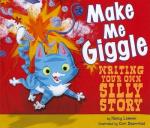November 2, 2016 | agudenburr
From https://ywp.nanowrimo.org/ : "National Novel Writing Month (NaNoWriMo) is a fun, seat-of-your-pants approach to creative writing. The challenge: draft an entire novel during the month of November. Why do it? For 30 crazy, exciting, surprising days, you get to lock away your inner editor, let your imagination take over, and just create! Participants begin writing November 1 and must finish by 11:59 PM on November 30. The word-count goal for our adult program is 50,000 words, but the Young Writers Program (YWP) allows 17-and-under participants to set reasonable-but-challenging individual word-count goals."
Children and Teen Resources
An illustrated introduction to writing a silly story that provides tips and instructions on writing an original story and offers a sample.
Offers guidance on writing stories, poems, drama, and nonfiction and includes profiles of famous writers, writing exercises, and tips from experts.
In this lively nonfiction book for young readers, bestselling author Gail Carson Levine shares her secrets of great writing.
Spell Check covers all the spelling rules and exceptions your child needs to know, with loads of tips and tricks to help them spell correctly. With high-frequency sight words that help with both reading and writing, as well as engaging activities including word searches, crosswords, and jumbles.
A guide to the writing process for teens, covering story, language, detail, character, writing an outline, and more.
Adult Resources
Steering the Craft has been completely revised and rewritten to address the challenges and opportunities of the modern era. This handbook is a short and deceptively simple guide to the craft of writing. Le Guin lays out ten chapters that address the most fundamental components of narrative, from the sound of language to sentence construction to point of view.
All too often, following the "rules" of writing can constrict rather than inspire you. With Story Trumps Structure, you can shed those rules to craft your most powerful, emotional, and gripping stories. Award-winning novelist Steven James explains how to trust the narrative process to make your story believable, compelling, and engaging, and debunks the common myths that hold writers back from creating their best work.
Just where do successful writers get their ideas? Author Fred White demystifies the creative process of idea generation by breaking it down. With practical advice, techniques, and exercises, plus 75 seminal ideas to jump-start your creativity, Where Do You Get Your Ideas? will pull back the curtain on the magic of idea generation and reveal the wealth of writing inspiration right in front of you.
The Writer's Lab provides writers with a medium for playing around with prose, poetry, etc. There are no rules here - only creative prompts and plenty of room for writing, sketching, diagramming, and planning stories, essays, and more. It can be picked up or put down on impulse, available to inspire creative thinking and offer pure joy on demand.
Writing 21st Century Fiction will help you write a novel for today's readers and market, filled with rich characters, compelling plots, and resonant themes. Author and literary agent Donald Maass shows you how to: create fiction that transcends genre, conjures characters who look and feel more "real" than real people, and shows readers the work around them in new ways. Writing 21st Century Fiction will strip away your preconceived notions about writing in today's world and give you the essential tools you need to create fiction that will leave both readers and critics in awe.
While creative writing manuals tend to use examples from twentieth- and twenty-first-century writers, The Jane Austen Writers' Club is the first to look at the methods and devices used by the world's most beloved novelist. Here Rebecca Smith examines the major aspects of writing fiction by sharing the advice Austen gave in letters to her aspiring novelist nieces and nephew. Also included are many and varied exercises for writers to try, using examples from Austen's work. The Jane Austen Writers' Club is a fresh primer on writing that features utterly timeless advice.
This book helps writers understand and make the most of their creative processes, from getting an idea to producing a finished work. Each chapter explores a single step in the creative process and coaches writers through the challenges in a way that is intuitive and organic.











